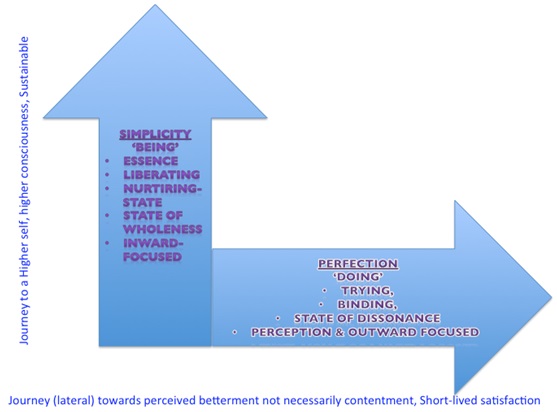
A Coaching Power Tool Created by Nivedita Das Narayan
(Life Coach, INDIA)
If you look for perfection, you’ll never be content.― Leo Tolstoy, Anna Karenina
Perfection
The Oxford Dictionary meaning of ‘perfection’ is the state or quality of being perfect. The word ‘perfect’ means having all the required or desirable elements, qualities, or characteristics; as good as it is possible to be; a state of absolute or complete.
By its own definition the word connotes ‘subjectivity’ or perception of absoluteness or completeness. Subjective expressions, by their very nature, differ from person to person. Let’s talk some examples. At a pure external level, the color of the skin – peach n’ cream – defines perfection for some, and a dark n’ dusky skin-tone evokes an image of perfection for some others. And thankfully for the same reasons the international fashion runways are as much about the dark-skin beauties as the light-skin glamour.
This, however, is an example of external perfection, which is relatively easier to discern & discuss. There are layers of perceptions & beliefs in us that are purely psychological – cognitive, subconscious or conceptual that defines our individual view of perfection. These beliefs are borne of a vast history of what can be termed as our conditioning – cultural, historical, familial, influences, education, life experiences, beliefs and a host of others.
Perfection is subjective because this host of influences, in varied permutations & combinations (as distinct as each individual), frame our thinking, belief system and define the absolute for each one of us.
How our chase for Perfection manifests (some possible situations):
In the above scenarios, no one loses out more than the person with the limited idea of perfection. While causing harm & pain to the recipients of their belief, they are their own worst victims. George is unable to rise beyond his beliefs to further a relationship, Amanda’s chase for perfection around the household causes her immense stress and disharmony, Lata loses a friend in trying to advocate her ideal of perfection in marriage and Jonathan’s pursuit of perfection is impacting his health and performance.
Why is the quest for Perfection limiting:
Perfection is
A perfectionist is typically living in denial of her own role in her life-story. Her unobserved mind measures everything (and everyone) against her set parameters and very often she herself falls short of fulfilling her ideal. Human beings are in an interdependent, collaborative environment where every success is interconnected; every failure impacts a family, a society, and a nation, beyond just the individual. Hence, to set off on a mission to measure every success on a subjective scale or unit of measurement is limiting and perhaps destined for failure. Simple awareness of this truth is a beginning of transformation.
Simplicity
It is simpler to talk about Simplicity. The Dictionary defines Simplicity as the quality or condition of being easy to understand or do. It is described as the quality or condition of being plain or uncomplicated in form or design.
Simplicity can be practiced and achieved, as the biggest step towards a life of Simplicity is to learn to let go. Simplicity is about negating the clutter of details & labels, about doing away with the should and the musts, about rising above judgment of self. In embracing Simplicity we make a shift from a state of ‘doing’ to one of ‘BEING’, we make a shift away from an unconscious to a conscious living. And making this shift empowers us and frees up energy. This is state of self-awareness. That in itself is perfection; as there is nothing left to take away, to negate or to let go.
No one lived and said it better than Mahatma Gandhi
Simplicity is the essence of Universality
Self-Application
Practicing Simplicity is easier said than done. Over years of living we collect and acquire ideas, beliefs, labels, self-image that become our identity. Something as simple as accolades for good handwriting at primary school can acquire a place of pride and can get adopted as part of a perfectionist- identity early in life. As we grow up, that identity may spread beyond just writing and encompass many other facets of life. It may spread to how we dress, how we speak, the hobbies that we acquire, the house we keep, the job we choose – and that’s around when the load of living this identity starts to impact life. The negative impact of living that image now crosses over to friends, family & colleagues.
The irony of such identification is that even when the conscious mind recognizes the need to detach from this identity – the ego, which has got defined and replenished by that self-image, throws up fear, foreboding and uncertainty around the consequences of a possible detachment. So, the perfectionist – living continues.
The Process of Churn
There is, of course, hope. Human being is in a state of evolution through life stages and is naturally geared to reject dissonance and experience glimpses of the ‘state of being’. These are moments allowed in by the conscious mind that slowly build a gap with our manufactured-state of identification. As the frequency of these waves of awareness grow, we can slowly start the process of dissociation from that identity. We can observe the energy inherent in these moments of awareness, streaming in to introspect, question & break up lifelong beliefs. We can feel each pulse, feel the tension slip away, feel the calm of Simplicity – of purely ‘being’ in the moment – take over.
Some Powerful Qs that can further unleash the conscious streaming:
Coaching Application
As Coaches we very often face Clients who measure life in achievements, in blocks of incremental perfection (defined by them), and they very often carry the ever-expanding gap between reality and expectation as the cross of failure or disenchantment, on their shoulders. They are victims of their own expectation and judgment, ostensibly feeling victimized by others.
As Coaches we can empower them by bringing the ease of ‘Simplicity of Being’ into their awareness and facilitate positive shifts, gradually.
Welcome the ‘Being’
The paradox of Being is that nothing is more perfect. It’s a place where nothing needs to be added neither anything left to take away.
In the Coaching process, when we notice the pattern of self-imposed perfection in a Client, we can help him take a step back to observe the situation with greater clarity. Powerful questions can open up the space for him. When the Client observes his situation, he’s able to distance himself from his beliefs and the choices he has made based on them. The detachment will allow him to consider different endings to choices made in the past. This is a liberating process.
It is also the Coach’s responsibility to bring to light that the Client is immensely capable of bringing Simplicity into his everyday living just as much as he could in his conscious streaming. This is critical to build self-belief and to plan for action ahead.
As a Coach, we must guide the Client to observe & identify areas of his life where he can watch the patterns of perfectionism colliding with his core of equanimity.
As Coaches we must make the most of that process, by holding the space for the conscious streaming of options and possible outcomes, to enter his consciousness. This is the classic Dance in the moment with the Client.
The powerful question that can aid this process could be
“Where in your life is there room for greater satisfaction & contentment?”
To help put a plan of action in place and to empower the Client along the path we must engage the Client in a discussion on
“What do you need to move forward?”
And devise a self-checking mechanism with questions such as
“ How will you know you are living in the BEING?”
“ How will you know you are on track?”
Coaching is a partnership with a belief in the innate resourcefulness of the Client. As a Coach it is entirely up to us to be steadfast in that belief and harness his dormant potential.
Reflections
- Is the adage ‘I am a perfectionist’ a boon or a bane?
- Is conscious – Perfectionism a possibility?
- Is Simplicity devoid of ambition?
- Is Perfectionism ever energy inducing or empowering?
They constantly try to escape
From the darkness outside and within
By dreaming of systems so perfect that no one will need to be good.
But the man that is shall shadow
The man that pretends to be.― T.S. Eliot, The Rock
